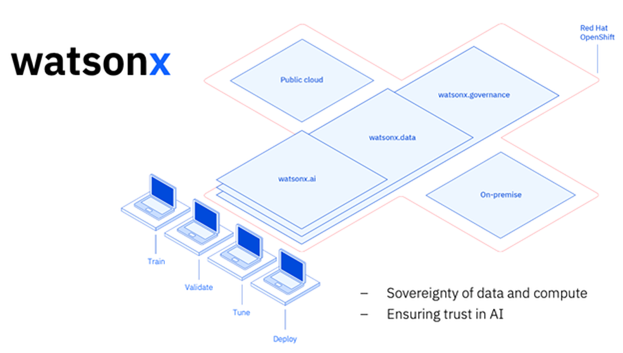IBM is making a big move in the world of artificial intelligence (AI) with the introduction of its new generative AI models and capabilities on the Watsonx platform. This announcement comes as IBM looks to establish its relevance in the competitive AI space and prove its worth in the industry. The new models, known as the Granite series models, are large language models (LLMs) that have the ability to summarize, analyze, and generate text, similar to models like OpenAI’s GPT-4 and ChatGPT.
Overview of the Granite series models
While IBM has not provided many details about the Granite series models, they are expected to be powerful and versatile. These models will be able to generate text based on the data they are trained on, making them useful for a wide range of applications. IBM has promised to reveal the data used to train the models, as well as the steps used to filter and process that data, ahead of the models’ availability in Q3 2022.
Comparison to rival LLMs
IBM’s new generative AI models are set to compete with other large language models in the market, including IBM’s own models. While it is difficult to make a direct comparison without detailed information about the Granite series models, IBM is confident that they will be able to hold their own against the competition. The company is committed to delivering high-quality and innovative AI solutions to its customers.
Availability in Q3 2022
IBM plans to make the Granite series models available to customers in the third quarter of 2022. This means that businesses and organizations will soon have access to these powerful generative AI models to enhance their own applications and processes.
Tuning Studio for tailor-made generative AI models
To complement the Granite series models, IBM is introducing Tuning Studio, a tool that allows users to tailor generative AI models to their specific data. With Tuning Studio, customers of IBM’s Watsonx platform can fine-tune models to new tasks with as few as 100 to 1,000 examples. This provides a flexible and customizable solution for businesses that need AI models that are specifically trained for their unique requirements.
Functionality of Tuning Studio
Tuning Studio is designed to be a user-friendly tool that empowers users to adapt generative AI models to their specific needs. By specifying a task and providing labeled examples in the required data format, users can fine-tune the models and optimize them for their intended applications. The tool offers a seamless and intuitive experience, allowing users to easily work with these complex AI models.
Deployment via IBM Cloud API
Once the models have been fine-tuned using Tuning Studio, users can easily deploy them through the IBM Cloud API. This makes it even more convenient for businesses to integrate these generative AI models into their existing workflows and systems. IBM’s Cloud API provides a reliable and scalable infrastructure to support the deployment of AI models and ensure their efficient and effective operation.

Synthetic data generator for tabular data
In addition to the new generative AI models and Tuning Studio, IBM is introducing a synthetic data generator for tabular data. Tabular data refers to collections of rows and columns found in relational databases, and the synthetic data generator allows companies to generate artificial data that mimics real-world data.
Generating synthetic data from custom data schemas
The synthetic data generator is capable of generating data based on custom data schemas that businesses provide. By leveraging internal data sets and custom data schemas, companies can create synthetic data that closely resembles their real-world data. This synthetic data can then be used for AI model training and fine-tuning.
Using synthetic data for AI model training and fine-tuning
The use of synthetic data for AI model training and fine-tuning offers several advantages. Firstly, it allows businesses to augment their existing data with additional synthetic data, enhancing the diversity and quantity of data available for training. This can lead to improved model performance and accuracy. Secondly, it reduces the risks associated with using sensitive or confidential data for training, as the synthetic data does not contain any real-world sensitive information.
Reduced risk and clarification
IBM claims that using the synthetic data generator can reduce the risk associated with training AI models. However, it is worth noting that training AI models with synthetic data has its own limitations and challenges. Synthetic data may not accurately capture all the nuances and complexities of real-world data, which could impact the performance of the models. IBM has been asked for clarification on this matter, and it is important for businesses to thoroughly evaluate the benefits and limitations of using synthetic data in their AI workflows.
Generative AI capabilities in Watsonx.data
IBM is expanding the generative AI capabilities in its Watsonx.data platform, a data store that enables users to access data while applying query engines, governance, automation, and integrations with existing databases and tools. These new capabilities will be introduced in the form of a self-service, chatbot-like tool for data manipulation.
Data discovery, augmentation, visualization, and refinement
The new generative AI capabilities in Watsonx.data will enable users to discover, augment, visualize, and refine their data for AI applications. The self-service tool will allow users to interact with their data in an intuitive and conversational manner, similar to a chatbot. This will make it easier for users to explore and manipulate their data, enabling them to gain insights and identify patterns that can inform their AI models.
Self-service, chatbot-like tool for data manipulation
The self-service tool in Watsonx.data will provide users with a user-friendly interface to interact with their data. Users will be able to ask questions, perform data transformations, and visualize their data through natural language queries. This eliminates the need for complex coding or data manipulation tasks, making it accessible to users with varying levels of technical expertise.
Introduction of vector database capability for RAG
IBM is also introducing a vector database capability in Watsonx.data to support retrieval-augmented generation (RAG). RAG is an AI framework that improves the quality of generative AI models’ responses by grounding them on external knowledge sources. This capability will enhance the capabilities of Watsonx.data, allowing users to leverage external knowledge to enhance the generation and refinement of AI models.

Watsonx.governance for protecting privacy and detecting bias
Ensuring privacy and addressing bias are important considerations when deploying AI models. To address these concerns, IBM is introducing Watsonx.governance, a toolkit that provides mechanisms to protect customer privacy, detect model bias and drift, and help organizations meet ethics standards.
Overview of Watsonx.governance toolkit
Watsonx.governance offers a comprehensive set of tools and features to support privacy protection, bias detection, and ethical practices in AI. The toolkit includes functionalities like data anonymization, access controls, and transparency measures to ensure that customer data is handled responsibly and in compliance with regulations.
Mechanisms for customer privacy protection
One of the key features of Watsonx.governance is the focus on customer privacy protection. IBM has implemented mechanisms and best practices to safeguard customer data and ensure that it is not compromised or misused. This includes encryption, data masking, and access controls to limit and monitor the access to sensitive data.
Detection of model bias and drift
Another important aspect of Watsonx.governance is the ability to detect model bias and drift. Bias in AI models can lead to unfair or discriminatory outcomes, and drift can occur when the performance of a model changes over time due to changes in the training data or other factors. IBM’s toolkit includes tools and algorithms to monitor and detect bias and drift, allowing organizations to take corrective actions and ensure fairness in their AI deployments.
Meeting ethics standards
Ethical considerations are paramount in the development and deployment of AI systems. IBM’s Watsonx.governance toolkit provides organizations with the means to meet ethics standards by promoting responsible AI practices. This includes guidelines, policies, and tools to assess and mitigate ethical risks associated with AI models, ensuring that ethical considerations are prioritized throughout the AI lifecycle.
Intelligent Remediation for IT incident management
To assist IT teams in managing and resolving incidents, IBM is leveraging its generative AI models with the introduction of Intelligent Remediation. This tool will utilize the power of AI to summarize incidents and suggest workflows for implementing solutions, streamlining the incident management process.
Leveraging generative AI models for summarizing incidents
Intelligent Remediation will leverage IBM’s generative AI models to automatically summarize incidents reported by IT teams. By analyzing incident reports and using natural language processing capabilities, the tool will create concise and informative summaries of incidents, allowing IT teams to quickly understand the nature of the issue.
Suggesting workflows for implementing solutions
In addition to summarizing incidents, Intelligent Remediation will also suggest workflows for implementing solutions to resolve the issues. By analyzing historical incident data and learning from past resolutions, the AI-powered tool will provide actionable recommendations and step-by-step workflows, guiding IT teams to effectively address and resolve incidents.
Launch date
IBM has not provided a specific launch date for Intelligent Remediation, but the tool is expected to be available soon. Once launched, it will provide IT teams with valuable support in managing and resolving incidents, improving efficiency and reducing downtime.

IBM’s strategy in the competitive AI field
IBM’s move to introduce new generative AI models and capabilities is driven by its commitment to establish itself as a leading player in the competitive AI field. The company faces pressure to demonstrate its worth and differentiate itself from other AI providers in the market.
Pressure to prove its worth
IBM’s second fiscal quarter revenue fell slightly short of analyst expectations, highlighting the need for the company to show its ability to deliver meaningful and impactful AI solutions. As businesses increasingly adopt AI technologies, IBM is under pressure to demonstrate its expertise and capability in providing reliable and innovative AI solutions that address the unique challenges faced by organizations.
Importance of AI for IBM’s future growth
IBM’s CEO, Arvind Krishna, has emphasized the importance of AI to the company’s future growth. The company sees AI as a key driver of its hybrid cloud and AI tech, including the Watsonx platform. IBM is confident in the potential of AI to drive revenue and free cash flow growth, and it is actively working with clients to address their AI needs and help them scale AI in a secure and trustworthy manner.
Positive response from customers
IBM has received a positive response from customers, with over 150 corporate customers already using the Watsonx platform. Major companies like Samsung and Citi have embraced IBM’s AI solutions, highlighting the value and relevance of IBM’s offerings in the market. This positive feedback serves as a testament to IBM’s ability to deliver impactful and effective AI solutions that meet the requirements of businesses across various industries.
Conclusion
With the introduction of new generative AI models and capabilities on the Watsonx platform, IBM is making a strong statement in the competitive AI field. The Granite series models, along with Tuning Studio, the synthetic data generator, and the generative AI capabilities in Watsonx.data, offer businesses powerful and customizable tools to enhance their AI workflows. With Watsonx.governance and Intelligent Remediation, IBM is addressing important considerations like privacy protection, bias detection, ethics, and incident management. IBM’s commitment to delivering innovative and reliable AI solutions positions the company for growth and success in the AI industry, generating confidence in revenue and free cash flow growth expectations.












